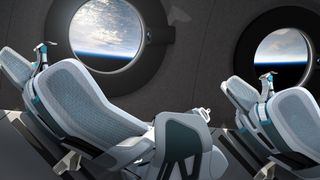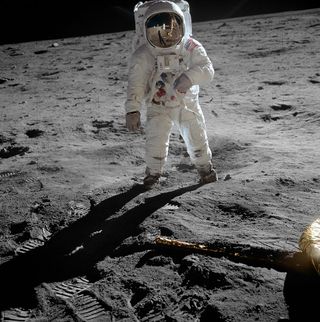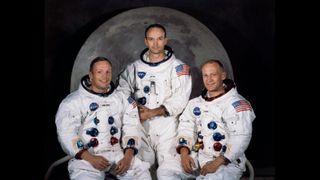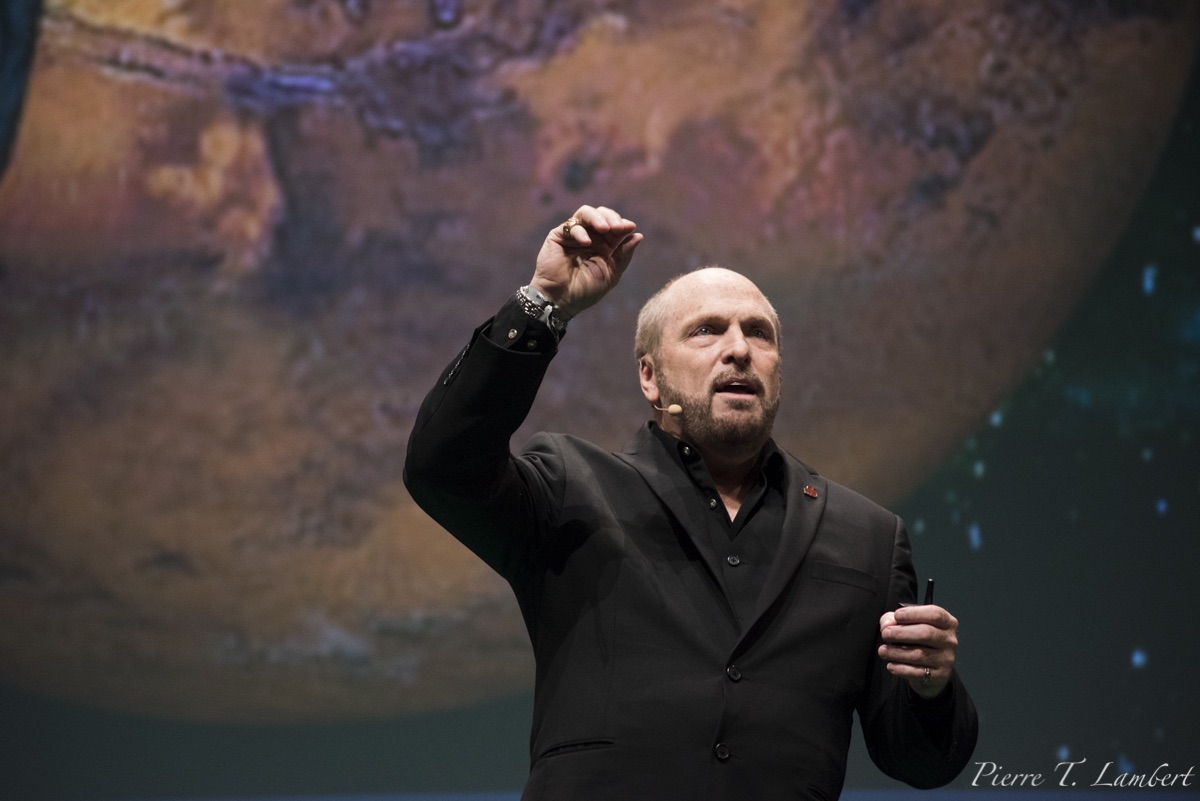
Apollo 11 vs. space tourism in 2022 (op-ed)
We honor the heroes of Apollo 11, yet deride the children who stand on their shoulders in the U.S. private space industry. Why?

This week we celebrate the anniversary of Apollo 11 and the first humans to step onto the moon. Meanwhile, as the federal space program that put them on the lunar surface dodders and sputters along, a new wave of humans are stepping out onto the space frontier, except this time they don't work for the government. Why is it important? Who benefits? What's the difference?
A so-called "space tourist" is typically a person who has worked to accumulate enough funds to obtain a ride into space; who goes through appropriate training, then, achieving a life-long dream, goes to space. While there, they look around and take in the experience. Many use their time in space to promote idea-based projects such as inspiring students or drawing focus to the Earth's environmental challenges. Others do scientific experiments, as in the recent week-long Axiom mission to the International Space Station.
The Apollo astronauts were paid employees of the U.S. government and therefore used taxpayer funds to obtain their ride into space. Their training was as rigorous as expected for anyone going to an unknown place for the first time. In most cases, going to the moon was the crowning achievement of their lives, even if, rather than selecting the destination, they were selected by NASA.
Related: Apollo 11: First men on the moon
While in space and on the moon, part of their job was to inspire American students. Also, while the environment wasn't a priority at the time, their images of the "little blue marble" of Earth helped birth the environmental movement. The science they did was amazing.
Of course, we cannot ignore the main reason they went - to demonstrate America's democratic free enterprise society was superior to the communist state of the Soviet Union and get the upper hand in the space race.
While today we honor the heroes of Apollo and all those who made their accomplishment possible, many deride the children who stand on their shoulders in the U.S. private space industry. Some critics have latched onto the admittedly terrible "tourist" brand and that the highest profile leaders of what I call the "New Space Revolution" are often extremely wealthy, as are the private astronauts buying the rides. Completely missing the irony, historical nature, and context, these critics use these two points as cudgels to hammer away at what by all rights should be the most celebrated accomplishment of the modern era - the opening of space to humanity.
Get the Space.com Newsletter
Breaking space news, the latest updates on rocket launches, skywatching events and more!
While my friends Buzz Aldrin and Neil Armstrong changed history with their first "small steps," the "giant leap" they spoke of did not immediately manifest itself. After taking the most expensive selfies in the world, they and their fellow lunar explorers went home.

But the seeds they planted, both technological and inspirational, have finally begun to burst out of Earth's gravity and reach for the stars. They may not look the same or as if they come from the same place, but they are. More importantly, what this new citizen-driven space race is beginning to accomplish is, or at least should have been, the goal of Apollo all along.
Buzz, Neil, and the other NASA astronauts were their era's Lewis and Clarks. SpaceX, Blue Origin, Axiom, and dozens of smaller commercial space companies building spaceships, orbital buildings, and the infrastructure we need to survive and thrive in space are today's railroaders, shopkeepers, and eventually will become our settlers. In other words, while it has been achingly slow for those of us working on the cause, the "giant leap" referred to in 1969 is finally occurring.
It just looks different than we've been taught to expect - because it is - but it is part of the same partnership between the government and people that makes us great.
Apollo was, in essence, a military campaign dressed in a civilian spacesuit. It was entirely government-funded, and once it achieved its definition of victory, it ended. Today, while grateful for the support of the government in technology development and its new role as a customer, space is being opened by private people, using the free enterprise system to build on their achievement and, this time, make it irreversible.

This pioneering phase does look different than our past. For example, aside from the important fact that this time we aren't taking outer space from anyone, in America's pioneer period one could just climb onto a wagon (or even walk) and get to the frontier (surviving was of course much more challenging). To get to, and survive on the space frontier requires a lot more front-end technology development. Someone has to pay for that, and given that at least in free nations it is not the government's job, citizens themselves have had to step up.
Yes, the people funding the companies laying the tracks to space have money. Yes, to support the development of what will someday become Earth's mass transit system to the solar system, tickets are being sold to people who have money. Yes, people opening space today will make money at some point, which will pay to open the airlock even wider, allowing more people to pass through to a new and exciting frontier of possibility. As imperfect and unfair as it may seem, this is the same economic progression that allows you to hop into a steel tube with wings and fly to see your grandmother, climb into your car and go camping, take your own selfies and send them instantly around the planet.
Related: Billionaires and Space — The Right Race
Apollo's planners missed this. As grand and essential as it was and will forever remain, Apollo was America answering a state command economy's push towards the moon by creating its own state-run program to get there first. That's why we aren't there now. It's why we aren't on Mars and one reason why Earth isn't surrounded by space power plants beaming clean energy to a world without a climate crisis. It's one reason so many children are uninspired, education levels are challenged, and our nation is fragmented - without a shared grand purpose to unite us. It's also why you can't get a new grown-in-space heart when yours fails or access a million other products, services, life, and planet-saving technologies that most probably would have evolved in a thriving Earth-space-moon economy.
This is why it is crucial to understand what is happening right now. The American private sector is taking on the work Apollo started. Those flying in private spaceships use different methods to pay for their flights and do not wear government uniforms. Still, the contribution they and the industry carrying them into space are making is exactly what will assure this time we get all those things I listed above and uncountable other benefits to how we live, right here on Earth. Rather than deride them, we need to give them more support, remove competing government programs, incentivize their growth, and accelerate the pace of this New Space economy so that more people can feel the benefits sooner.
Having signed up the first private citizen to buy a ticket to the space station, I hate the word "tourist." I find it demeaning, misleading and aside from insulting people who have, just like NASA astronauts, aspired their whole lives to go into space — and in their case, have found their own way to pay for it. In the big picture, it doesn't matter. Posing next to a flag or floating next to your new space-invented gadget, what matters is your legacy, what you create for the future.
We celebrate the accomplishment of Apollo one day a year. The legacy of Apollo is being celebrated each time a new human goes into space, no matter how they get there or who pays for it. The legacy of Apollo is on display with the flight of every new American spaceship, the launch of every new American entrepreneurial space company, and the ever more rapid expansion of our economy into the frontier.
Those few who went before us and those few going now will become more, and more of us will be able to afford to go ourselves. As we do, we will transition from looking around to putting stakes in the ground. We will move from exploration to industrialization. We will move from space as a place to look at the Earth to a place from which we can help save her. And this time, after our next steps and giant leaps, rather than going home, we will be building new ones.
After all, no matter the funding source or the technology, the opening of the space frontier is the grandest and most exciting event in humanity's history. I hope that as it accelerates, the derision will fade, and this will be ever clearer.
Rick Tumlinson is the founder of SpaceFund, a venture capital firm investing in space startups. He also founded the Space Frontier Foundation, Earthlight Foundation, the Space Cowboy Ball, and was a founding board member of the X Prize Foundation.
Follow us on Twitter @Spacedotcom or on Facebook.
Join our Space Forums to keep talking space on the latest missions, night sky and more! And if you have a news tip, correction or comment, let us know at: community@space.com.

Both a rebel and a respected leader, Rick is listed as one of the top 100 influential people in the space field. Called one of the world’s top space “visionaries,” Rick helped coin the term "NewSpace" and worked to create the new commercial space industry highlighted by Elon Musk and Jeff Bezos.
A leading writer, speaker, and six-time Congressional witness, Rick helped start the first mission to find water on the Moon, signed the first ever commercial data purchase agreement with NASA, helped start NASA’s Lunar Exploration Analysis Group, led the commercial takeover of the Russian Mir space station, signed the first private astronaut to fly to the space station, co-founded the Space Frontier Foundation, and was a founding board member of the X-Prize.
As a result of his world-changing work, in 2015 he won the World Technology Award along with Craig Venter of the Human Genome project. He founded the SpaceFund venture capital company with 19 space companies in its portfolio and is a member of the US Space Force Doctrine Advisory Group.
Rick's The Space Revolution "radiopod" is featured on IHeart Radio Network's iRoc Space Radio and is available on most major podcast sites. He hosts the New Worlds Conference and the Space Cowboy Ball in Austin, Texas, and his non-profit EarthLight Foundation is creating an inclusive new movement to use space to protect the Earth and expand life into the cosmos.
